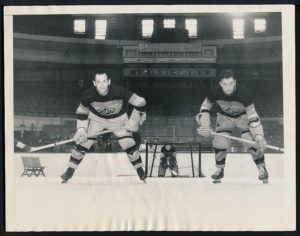When people think of hockey players from Syracuse and Western/Central New York, many bring up Tim Connolly (Baldwinsville), Jimmy Howard (Syracuse), Patrick Kane (Buffalo), Ryan Callahan (Rochester), Nick Foligno (Buffalo), Erik Cole (Oswego), Dustin Brown (Ithaca), or the Sestito Brothers (Tom & Tim, Rome). During the 2016-2017 season, Baldwinsville native, Boo Nieves, was recalled from the Hartford Wolf Pack of the American Hockey League to the New York Rangers, adding to the already impressive list of Western, Central, and Northern New Yorkers to have played in the NHL. Alex Tuch, a Baldwinsville Hockey alum, was taken 18th overall at the 2014 draft. He now plays for the Las Vegas Golden Knights‘ AHL affiliate, the Chicago Wolves.
However, few will remember Syracuse native Alex Levinsky, who was not only one of the first professional players from New York (Billy Burch joined nearly a decade earlier), but the first American-born Jewish hockey player in the National Hockey League (NHL). Canadian-Jewish players Sam Rothchild and Joe Ironstone both played in the NHL in 1924-1925, though Ironstone never saw action during his time with the Ottawa Senators (1917).

Alex Levinsky (left) and Art Weibe of the Chicago Blackhawks in 1935, photo by the Associated Press Nov. 7.
Born in 1910, Alex “Mine Boy” Levinsky played for the Toronto Maple Leafs, New York Rangers, and Chicago Blackhawks over parts of nine seasons. Levinsky won Stanley Cups with the Leafs in 1932 and Blackhawks in 1938. The nickname “Mine Boy” came from his parents, who would attend their son’s games and shout, “That’s mine boy.”
The Levinsky family moved to Toronto early in Alex’s life. There, he began to attract attention as a young player in the late 1920s while playing junior hockey for the Toronto Marlboros. In 1930, team owner Conn Smythe signed him directly from the Marlboros for the 1930-31 season.
Smythe owned both the Leafs and the Marlboros and, before the NHL enacted the Entry Draft in the 1960s, he hand-selected Toronto’s brightest players to play for the Marlboros as an amateur and then signed them to play in the NHL.
Levinsky would help lead the Leafs to team’s first Stanley Cup under their new name in 1932. Two years later, in April 1934, Levinsky, who was coming off of a career year, was traded to the New York Rangers by Smythe. Often regarded as one of the league’s best owners, his legacy isn’t without some controversy, however.
According to a letter written by a fan and submitted to The Toronto Star, Smythe “was an advocate of racism. He not only discriminated against black athletes but would not hire young Jewish men to sell programs and refreshments at Leafs games. He traded away defensemen Alex ‘Mine Boy’ Levisnky because Al was Jewish.” But his bigotry didn’t end there. Herb Carnegie, a talented black hockey player in the 30s, 40s, and 50s was once told by his teammate Ed Wildey that Smythe had said “he’d take you tomorrow if he could turn you white.” Over the years, players from this era have confirmed this and other racist quotes from Smythe, though hockey historians still question their legitimacy. However, according to a 2004 ESPN article, Smythe may have given public voice in favor of a league-wide policy of exclusion in 1938. If not for that, Carnegie most likely would have been the first black hockey player in the NHL. As that was not the case, it would take another 20 years for Willie O’Ree to break hockey’s color barrier after he was called up to the Boston Bruins for two games during the 1957-58 season.
Levinsky’s time in New York was short. He played only 21 games during the 1934-35 season on Broadway. Following that season, he was traded again, this time to Chicago, where he would play the next five seasons winning his second Stanley Cup in 1938. After Chicago’s championship season, the Blackhawks traded Levinsky, who was the oldest player on their blue line at the time, to the International-American Hockey League’s Philadelphia Ramblers for Joe Cooper. Levinsky didn’t want to play in the minors and decided he wouldn’t accept the move to Philadelphia and did not report to the team. He was promptly suspended, though he would eventually report to Philadelphia, but only after Lester Patrick of the New York Rangers assured him he would soon return to the NHL with the Rangers, which never happened. Instead, he would end is professional career split between Philadelphia and Chicago.
During his time with Philadelphia, it’s possible he would have played at least a handful of games against the Syracuse Stars, who played their games at the New York State Fairground Coliseum throughout the 1930s. Both teams played in the International-American Hockey League.
In 367 NHL games Levinsky scored 19 goals and 49 assists for 68 career points. He added another 2 goals and 1 assist in 37 playoff games.

